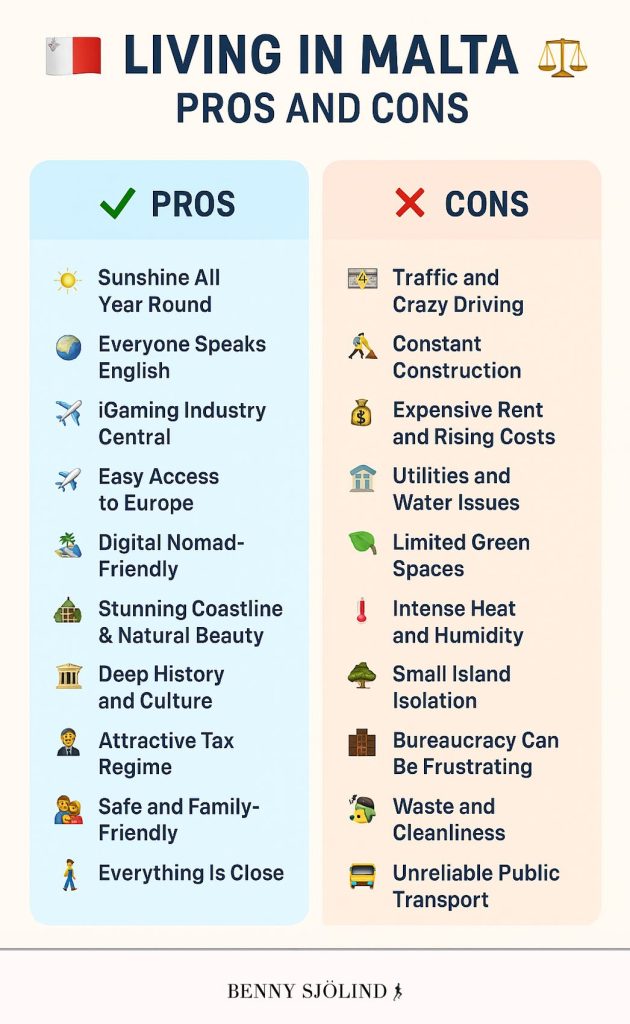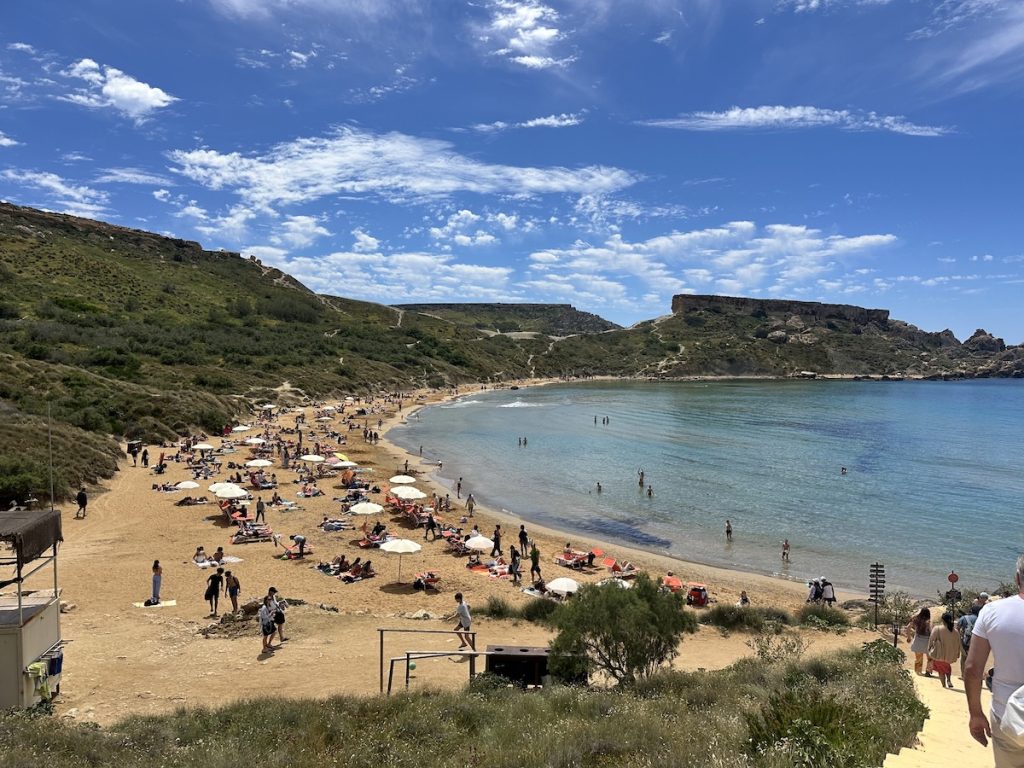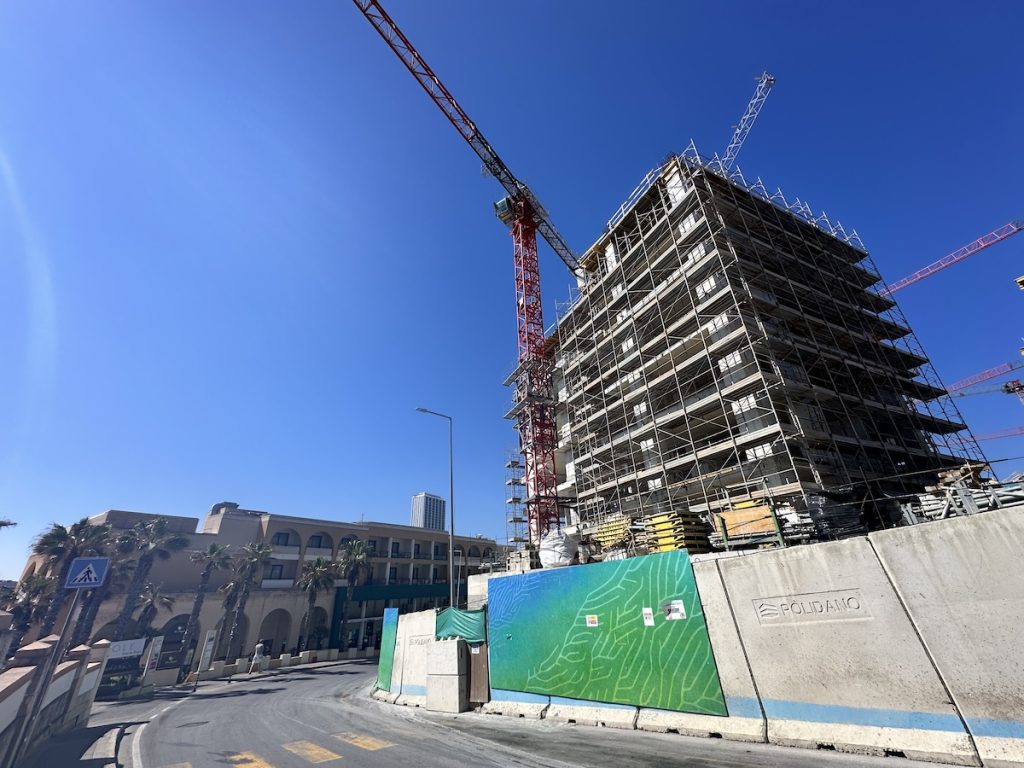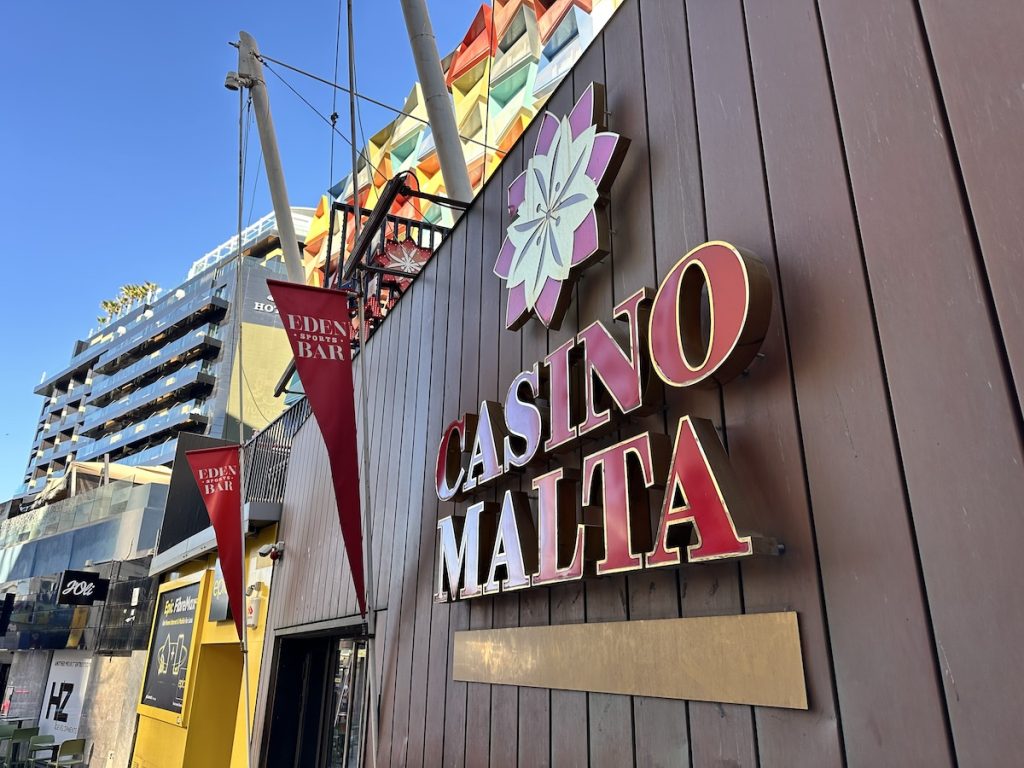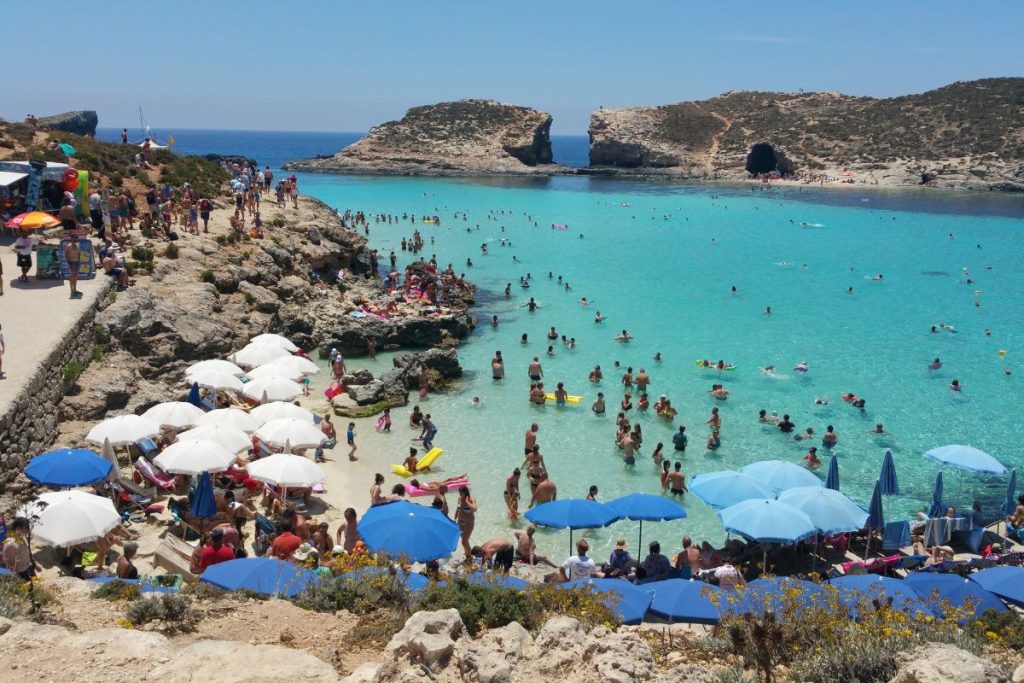A tiny island with a global reach, Malta is where ancient history meets modern innovation. With over 300 days of sunshine, a booming tech sector, and a rich cultural heritage, this Mediterranean nation punches far above its weight.
Located between Europe and North Africa, Malta offers a unique blend of laid-back island life and a thriving professional scene — especially for those in iGaming, fintech, and remote work.
Living in Malta – My Honest Pros and Cons After 6 Years
I’ve lived in Malta for almost six years now — and during that time, I’ve experienced nearly everything this tiny Mediterranean island has to offer. From the long, sun-drenched summers and close-knit iGaming community to the daily challenges of traffic and construction, Malta is a place of contrasts.
Whether you’re considering moving here for work, lifestyle, or curiosity, here’s a personal and honest look at the pros and cons of living in Malta based on my own long-term experience.
Pros of Living in Malta
1. Sunshine All Year Round
One of the biggest lifestyle perks – over 300 sunny days a year. Winters are short and mild, which makes being outdoors a part of everyday life.
2. Everyone Speaks English
English is one of the official languages, and almost everything from paperwork to casual conversations happens in English – a huge benefit for expats.
3. iGaming Industry Central
Malta is the global hub for iGaming. If you work in casinos, sports betting, affiliate marketing, SEO, or fintech — this is where the action happens. It’s what brought many of us here.
4. Easy Access to Europe
Despite its small size, Malta has great air connections. Quick and affordable flights to most major European cities — great for weekend getaways or business trips.
5. Digital Nomad-Friendly
Solid internet, co-working spaces, and visa schemes like the Nomad Residence Permit make it a go-to spot for remote workers.
6. Stunning Coastline & Natural Beauty
While it lacks big forests or lakes, Malta makes up for it with crystal-clear waters, limestone cliffs, and unique diving spots.
7. Deep History and Culture
Living in Valletta or Mdina feels like walking through a living museum. With prehistoric temples, baroque palaces, and lively village festas — culture is everywhere.
8. Attractive Tax Regime
Malta’s tax benefits — particularly for foreign professionals and companies — are a major draw for those in finance and iGaming.
9. Safe and Family-Friendly
Crime is low, and the island has a strong sense of community. Great if you’re raising a family or just want peace of mind.
10. Everything Is Close
The short distances make life easy. Work, gym, beach, and your favorite bar are often just a few minutes apart. You rarely need to plan your day around commuting.
11. Mediterranean Food Scene
Think fresh seafood, Maltese ftira, Italian pasta, and local wines — plus plenty of international options thanks to the expat mix.
Cons of Living in Malta
1. Traffic and Crazy Driving
It might sound strange on such a small island, but the traffic can be brutal. Narrow streets, poor road planning, and aggressive driving don’t help.
2. Constant Construction
New buildings are going up everywhere — often right next to where you live. Noise and dust are part of daily life, especially in central areas.
3. Expensive Rent and Rising Costs
Malta used to be cheap — not anymore. Rent in Sliema, St. Julian’s, or Gżira is comparable to many mid-sized European cities, sometimes without the same quality.
4. Utilities and Water Issues
Power cuts still happen, water isn’t drinkable from the tap, and bills can spike during summer.
5. Limited Green Spaces
If you love forests, mountain trails, or large public parks — you might miss them here. Malta is rocky and dry, especially in summer.
6. Intense Heat and Humidity
July and August can be oppressively hot, and the humidity makes it even harder — especially in older apartments without AC.
7. Small Island Isolation
There’s a limit to how far you can explore — and you might feel stuck after a while, especially if you’re used to a more dynamic pace of life.
8. Bureaucracy Can Be Frustrating
Getting permits, dealing with banks or government offices can test your patience. Processes are slow, and sometimes unclear — even if everyone speaks English.
9. Waste and Cleanliness
While improving, some areas suffer from poor waste management, overflowing bins, and lack of recycling options.
10. Unreliable Public Transport
Buses exist, but they’re slow, irregular, and often overcrowded. If you live here long-term, you’ll probably end up using Bolt or buying a car.
The iGaming Capital of Europe
Malta has become the undisputed hub for iGaming in Europe — and arguably the world. Thousands of professionals have relocated here to work in the casino, sports betting, and affiliate marketing sectors.
Why Malta?
- Home to the Malta Gaming Authority (MGA) — one of the most respected gaming regulators globally
- Attractive tax and business incentives
- English-speaking workforce
- A strong network of affiliates, tech firms, and service providers
- Year-round networking events, including SiGMA and iGaming NEXT
Whether you’re a startup, an affiliate, or an industry veteran, Malta is where the iGaming world connects.
A Paradise for Digital Nomads and Expats
Beyond business, Malta offers a lifestyle that many only dream of. It’s one of the top destinations for digital nomads, entrepreneurs, and creatives thanks to:
- The Nomad Residence Permit, allowing remote workers to stay long-term
- Reliable internet and modern co-working spaces
- A vibrant international community
- Direct flights to most of Europe
From early morning swims in Balluta Bay to sunset walks along the Dingli Cliffs, Malta balances work and life in a way few other places can.
Culture, Food & History
Malta’s charm isn’t just in its business-friendly policies or beaches — it’s in the layers of history and culture that date back over 7,000 years.
Explore:
- The ancient city of Mdina
- UNESCO World Heritage sites like the Megalithic Temples
- Maltese cuisine, influenced by Italy, North Africa, and the Middle East
- Bustling markets, hidden coves, and traditional festas
The islands are a playground for history buffs, foodies, and adventurers alike.
Living in Malta
Thinking of moving to Malta? Here are a few quick facts:
| Category | Details |
|---|---|
| Language | English & Maltese |
| Currency | Euro (€) |
| Population | ~520,000 |
| Driving Side | Left-hand side |
| Weather | Mediterranean climate, hot summers |
| Best Cities | Sliema, St. Julian’s, Valletta, Naxxar |
| Monthly Rent | €850–€1,800 (depending on area & size) |
Malta’s Tourism Reached Record Levels in 2024
In 2024, Malta surpassed 3.5 million tourist arrivals, setting a new all-time high for the country’s tourism sector. This marked a significant increase from the previous record of 3 million visitors in 2023 and a full 30% jump from the pre-pandemic peak of 2.7 million in 2019.
According to Malta’s National Statistics Office, October alone saw 355,561 arrivals, up 13.2% compared to the same month the year before – underscoring the island’s growing appeal as an off-season destination.
The total number of overnight stays during October 2024 exceeded 2.2 million, a 7.3% increase year-over-year. Of these, a notable 87.1% were spent in rented accommodations, showing continued strength in Malta’s hospitality sector. The average length of stay remained steady at 6.2 nights.
Tourism revenues reached nearly €356.5 million in October, reflecting an 18.4% increase compared to 2023. Furthermore, 57.4% of all visitors – around 203,950 people — included Gozo and Comino in their travel itineraries, confirming the sustained popularity of Malta’s sister islands.
A combination of UNESCO World Heritage sites, dynamic cultural events, Mediterranean charm, and a fast-growing film industry helped drive the growth. Strategic investments in infrastructure, luxury accommodations, and attractions – including the development of cultural landmarks like MICA (Malta International Contemporary Art Space) – significantly enhanced the visitor experience and reinforced Malta’s status as one of Europe’s most attractive destinations in 2024.
Final Thoughts
Whether you’re in iGaming, building your brand remotely, or simply looking for a change of pace, Malta offers a rare mix of professional opportunity and island serenity.
It’s more than a relocation – it’s a reset.

